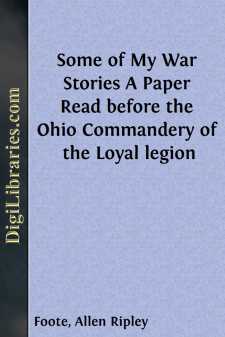Categories
- Antiques & Collectibles 13
- Architecture 36
- Art 48
- Bibles 22
- Biography & Autobiography 813
- Body, Mind & Spirit 142
- Business & Economics 28
- Children's Books 17
- Children's Fiction 14
- Computers 4
- Cooking 94
- Crafts & Hobbies 4
- Drama 346
- Education 46
- Family & Relationships 57
- Fiction 11829
- Games 19
- Gardening 17
- Health & Fitness 34
- History 1377
- House & Home 1
- Humor 147
- Juvenile Fiction 1873
- Juvenile Nonfiction 202
- Language Arts & Disciplines 88
- Law 16
- Literary Collections 686
- Literary Criticism 179
- Mathematics 13
- Medical 41
- Music 40
- Nature 179
- Non-Classifiable 1768
- Performing Arts 7
- Periodicals 1453
- Philosophy 64
- Photography 2
- Poetry 896
- Political Science 203
- Psychology 42
- Reference 154
- Religion 513
- Science 126
- Self-Help 84
- Social Science 81
- Sports & Recreation 34
- Study Aids 3
- Technology & Engineering 59
- Transportation 23
- Travel 463
- True Crime 29
Some of My War Stories A Paper Read before the Ohio Commandery of the Loyal legion
Description:
Excerpt
hen, in 1861, President Lincoln called for 75,000 volunteers to enlist for a three months’ service to uphold the authority and preserve the unity of the United States, I, a boy of nineteen, sought the first opportunity that offered, to enlist. I was at the door of the recruiting office long before it opened.
Dr. D. W. Bliss, who afterward became a famous army surgeon and was one of the surgeons who attended Presidents Lincoln and Garfield, gave me the required physical examination. When measuring my height he said—“Raise your heels, you are a little short.”
Before my regiment was mustered in, the call came for 300,000 volunteers to enlist for a three-years’ service, and we were mustered in for three years.
My regiment was ordered to Washington as soon as it was ready to move. Clad in grey uniforms and armed with old muzzle-loading Harper’s Ferry muskets, which had been changed from flint locks, we made a valiant appearance and received ovations from the populace of every city and village through which we passed. This is especially true of Ohio. At one station all of the ladies of the town turned out loaded with small bouquets of flowers, to which were pinned slips on which they had written patriotic sentiments. These they threw into the car windows. The sentiment on the one I caught read—“The women of Ohio are for the Union—to a man.”
Our first camp was at the Maryland end of the Chain Bridge, which crossed the Potomac above Washington. We marched from this camp to Centerville, Va., to engage in the first battle of Bull Run. The first sight we had of war was on the morning of the second day’s march, when we came upon some camp fires where the Confederates had cooked their breakfast that morning before leaving for Bull Run.
We arrived at Centerville before noon of the third day and made our camp there. After dinner we were ordered to advance, in light marching order, toward Blackburn’s Ford. When near the Run we were deployed to the left of the road in an open field on a hillside sloping down to the Run, which was concealed by a growth of bushes and trees. Here we were ordered to rest. While in this position we were startled by seeing a finely-mounted and uniformed Confederate Officer ride out from these bushes just at the right of our regiment. I presume every man in the regiment saw him. Some three or four of the boys, having the instinct of war in them, immediately raised their guns to shoot him. Seeing this, our Colonel raised his hand in a forbidding attitude and called out,—“Why, boys, you would not shoot a man in that way, would you? Don’t shoot!!” The Confederate Officer, after inspecting our position, returned to his command unharmed. In about fifteen minutes, as soon as he could maneuver his regiment, he ordered it to fire. We saw the flash and smoke and heard the roar and the hissing of the bullets. This is the first time we were under fire. I am glad to say we were under it about 20 feet. Every bullet passed over us. Not a man in our regiment was hit.
After this volley we were complimented with a few shots from a battery of six-pound field pieces, which also went wide of their mark—assuming that they were shooting at us.
Having received these compliments, we were withdrawn from the field and returned to our camp at Centerville....


